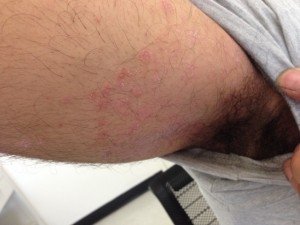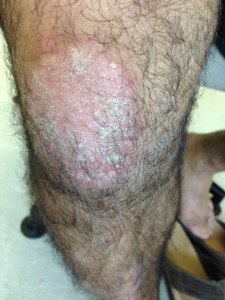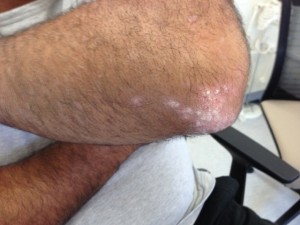Can TNFi for Psoriatic Arthritis worsen Psoriasis?

By Dr Irwin Lim, Rheumatologist
Tumor Necrosis Factor inhibitors (TNFi) have been used for more than a decade as effective treatment for a variety of inflammatory diseases such as rheumatoid arthritis, ankylosing spondylitis, juvenile idiopathic arthritis, inflammatory bowel disease and psoriasis/psoriatic arthritis.
 Many patient with psoriasis show rapid and marked response in their skin lesions with TNFi therapy. This is what I as a rheumatologist would expect and tell my patients with psoriatic arthritis when I commence them on TNFi therapy.
Many patient with psoriasis show rapid and marked response in their skin lesions with TNFi therapy. This is what I as a rheumatologist would expect and tell my patients with psoriatic arthritis when I commence them on TNFi therapy.
Paradoxically, some patients, even when their psoriatic arthritis manifestations improve (these include spinal pain, joint swelling, enthesitis and tendon inflammation), develop worsening psoriasis or new psoriasis-type skin lesions.
These psoriasis-type or psoriasiform lesions have been reported in patients with the range of different diseases treated with these TNFi agents. They've also occurred with the full range of different TNFi medications.
The most common lesions are plaque and palmopustular psoriasis but a small number of patients have also presented with guttate lesions.
 The lesions can occur anytime following initiation of the TNFi, weeks or years after.
The lesions can occur anytime following initiation of the TNFi, weeks or years after.
You can appreciate that in the small minority who do develop these skin lesions that the management can be difficult, especially if the drug is working effectively to control whichever disease it was started for.
Management options include:
- Making the diagnosis. Infection needs to be rules out and we need to work with a dermatologist as a skin biopsy may be very useful.
- A variety of topical treatment (corticosteroid or vitamin D derivative creams or ointments) are often required.
- If the psoriasiform lesions are severe or distressing for the patients, discontinuation of the TNFi is recommended.
- Therapies including phototherapy, methotrexate, acitretin and cyclosporine may be required.
- If the lesions are less severe, a switch to another TNFi medication can result in improvement. This response varies from patient to patient and is not predictable.
- Swapping to a different class of medication with a different mode of action, ie non-TNFi
Have you experience paradoxical psoriasiform lesions on TNFi therapy?
How did you deal with it?
Dr Irwin Lim is a rheumatologist and a director of BJC Health. You should follow him on twitter here. Arthritis requires an integrated approach. We call this, Connected Care. Contact us.
